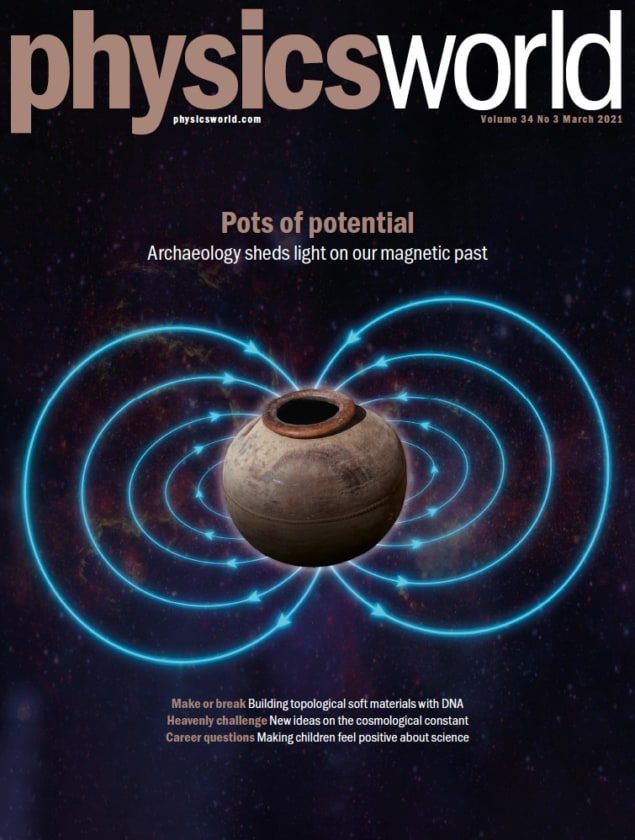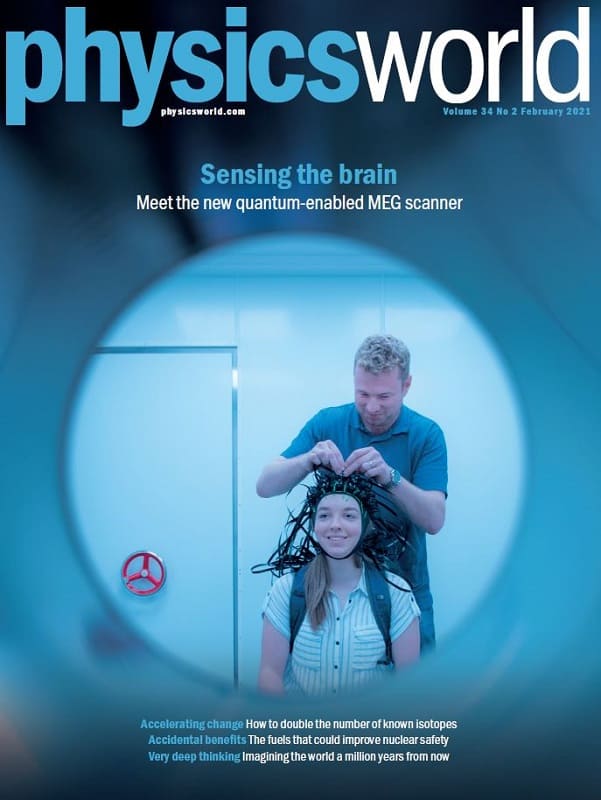Using ancient pots to predict the Earth’s magnetic field, plus the strange DNA/soap link, and challenging Einstein’s “biggest blunder”

The idea that a record of the Earth’s magnetic past
might be stored in objects made from fired clay dates back to the 16th century when William Gilbert, physician to Queen Elizabeth I, wondered if the Earth is a giant bar magnet and that clay bricks possess a magnetic memory.
He was right and Gilbert’s far-sighted notion now forms the basis of a well-established method for dating archaeological sites that contain kilns, hearths, ovens or furnaces.
Known as “archaeomagnetism”, this field of research is helping geophysicists gain insights into local changes in the Earth’s magnetic field over the past 3000 years, and – as Rachel Brazil explains in the March 2021 issue of Physics World – how it might change in future.
If you’re a member of the Institute of Physics, you can read the whole of Physics World magazine every month via our digital apps for iOS, Android and Web browsers. Let us know what you think about the issue on Twitter, Facebook or by e-mailing us at pwld@ioppublishing.org.
For the record, here’s a run-down of what else is in the issue.
• China detector hints at new physics – The PandaX-II dark-matter experiment has confirmed previous signs of exotic particles but further evidence will be needed, as Edwin Cartlidge reports
• UAE Hope probe reaches Mars orbit – The United Arab Emirates has become the first Arab country to reach another planet – a feat that it hopes will turbocharge its science base, as James Dacey reports
• Concerns raised as Oxford renames physics chair – The University of Oxford has announced that its Wykeham chair of physics will be renamed after the giant Chinese technology corporation Tencent, which denies claims it has links with the Chinese security services. Michael Allen reports
• Widening career aspirations – As children narrow down their career interests from an early age, Carol Davenport says it is important that they are brought up with a positive attitude towards science
• Supporting science in difficult times – With COVID-19 fostering anti-science conspiracies, Caitlin Duffy says that scientists have a duty to speak up and challenge misinformation
• Grounds for optimism – The solution to climate change could be lying beneath our feet. James McKenzie examines the potential of pumps that warm our homes and offices by extracting heat from the ground below
• Beneath the rotunda – Robert P Crease reflects on the US Capitol’s invasion from a unique perspective
• Digging up magnetic clues – Analysing magnetic information stored in ancient artefacts is revealing the recent history of the Earth’s magnetic field and providing clues to the changes we might expect in the future. Rachel Brazil explains

Quantum sensing the brain, making isotope beams and nuclear-fuel safety: the February 2021 issue of Physics World magazine is now out
• A new generation takes on the cosmological constant – The long-standing problem of the cosmological constant, described both as “the worst prediction in the history of physics” and by Einstein as his “biggest blunder”, is being tackled with renewed vigour by today’s cosmologists. Rob Lea investigates
• Make or break: building soft materials with DNA – DNA molecules are not fixed objects – they are constantly getting broken up and glued back together to adopt new shapes. Davide Michieletto explains how this process can be harnessed to create a new generation of “topologically active” material
• Hunt for the superheavies – Hamish Johnston reviews Superheavy: Making and Breaking the Periodic Table by Kit Chapman
• Strolling in the deep – Ian Randall reviews The Brilliant Abyss: True Tales of Exploring the Deep Sea, Discovering Hidden Life and Selling the Seabed by Helen Scales
• Rethinking nuclear for a greener planet – Troels Schönfeldt, co-founder and chief executive of Danish start-up Seaborg Technologies, talks to Julianna Photopoulos about his career in nuclear and particle physics – and how he unintentionally became an “impact entrepreneur”
• Fine structure and black holes – Sidney Perkowitz pays tribute to new research on these astronomical marvels
